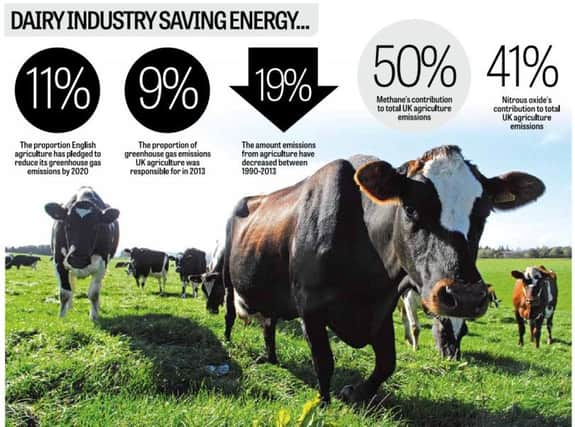‘Green’ challenge can be met if farmers receive fair returns


According to fresh figures, the dairy processing industry has achieved a 15 per cent improvement in its energy efficiency since 2008; exceeding a 2020 target of 13.6 per cent under the dairy industry’s Climate Change Agreement (CCA) - a voluntary scheme which sees the industry receive a reduction in the Climate Change Levy if targets are met.
That headline figure, reported by Dairy Energy Savings, is part of a long-term trend, with greenhouse gas emissions from UK dairy farms having declined sharply to now account for less than two per cent of the UK’s total emissions.
Advertisement
Hide AdAdvertisement
Hide AdGerry Sweeney, chairman of Dairy Energy Savings, a subsidiary of Dairy UK, said: “These results tell us that the scheme continues to drive improvement in the dairy sector. The figures indicate that dairy companies are committed to their sustainability goals in a pragmatic and purposeful way.”
The progress has come because processors have invested in more efficient equipment, technologies and product mixes, fuel switches and better employee engagement, Dairy UK said.
Dairy farmers are trying to follow suit, and have been forced to examine every aspect of their businesses as a result of depressed farmgate milk prices. This process has led to financial and energy savings, brought by low cost solutions such as adjustments to feed rations, Sian Davies, the National Farmers’ Union’s (NFU) chief dairy advisor said.
However, dairy farmers’ tight profit margins have meant larger projects are largely unachievable at present, she said.
Advertisement
Hide AdAdvertisement
Hide Ad“Dairy farmers on ‘retailer aligned contracts’ such as those in Tesco’s Sustainable Dairy Group, can invest more. For farmers on those contracts the milk price has dropped by four cent between March last year and March this year. This compares to the rest of our dairy producers who have seen an overall price fall of 20-30 per cent in 12 months.”
At an environmental summit in Paris earlier in the year, NFU vice president Guy Smith, said: “There are exciting new technologies out there that can help farmers reduce their carbon footprint but it needs remembering that these will only arrive on farm if farmers can afford to make the necessary investment.”
Richard Pearson, the union’s regional director, added: “Farmers need to be profitable to be able to invest in new technologies. If the income isn’t there, their priority is going to be staying afloat.”
NFU climate change advisor, Dr Ceris Jones, said there are some things farmers can do cheaply to drive efficiencies.
Advertisement
Hide AdAdvertisement
Hide Ad“There are things that farmers can do themselves and clearly are doing through nutrient management. Other things require investment and the ability to invest depends on a host of things such as the price they make for their product, but there might be smaller and simple investments they can make - it depends on their business structure, the state of the marketplace and where they want to focus their efforts.”